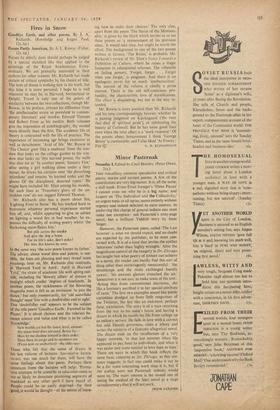Fires in Snow
Poems Partly American, By A. L. Rowse. (Faber, 12s. 6d.)
POEMS by elderly dons should perhaps be judged by a special standard like that applied to the paintings of the Royal AcadeMician Extra- ordinary. We are primarily interested in their authors for other reasons. Mr. Richards has made certain of critical sympathy by his choice of title. The note of doom is nothing new in his work, but this time it is more personal. I hope he is well wherever he may be, •in Harvard, Switzerland or Delphi. Travel is only one of the point's of similarity between the two collections, though Mr. Rowse, in his preface, stresses his difference from 'the intellectualist strain so prevalent in contem- porary literature' and invokes Edward -Thomas and Robert Frost as his models. Both volumes give the impression of autobiography, the second more directly than the first. The academic life of theory is contrasted with the life of practice. The experience of increasing age brings exclusion as well as detachment. 'Avid of life,' Mr. Rowse in 'The Choice' goes 'like a madman' from the win- dow that looks on the college garden to the win- dow that looks on 'this learned prison, the walls that shut me in.' In another poem, 'January Fire,' after seeing a girl walking alone under a fiery sunset, he draws his curtains over 'the disturbing splendour' and returns 'to learned order and the gloom Of the diSciplined, deserted room.' He might have included Mr. Eliot among his models, for such lines as 'Transitory glory of the un- trodden rose' do not suggest Edward Thomas.
Mr. Richards also has a poem about fire, 'Lighting Fires in Snow.' He has worked hard to transmute whatever personal experience started him off, and, whilst appearing to give us advice on lighting a wood fire in bad weather, he ex- presses the difficulty of writing poetry whilst 'the thickening snow-flakes hiss.'
But pile across the smoke And give the dog a bone.
For its life's sake, don't poke!
The wise fire knows its own.
In the same way 'the wise poem knows its father.' The advice, about wood fires and poems, is sen- sible, the lines are pleasing and may reveal more meanings later on. Mr. Richards also contrasts, in 'Harvard Yard in April : April in Harvard Yard,' the strain of academic life with spring out- side, including the 'flowery allure' of dresses in sunlight which confer 'degrees of loneliness.' In another poem, the recklessness of the flowering magnolia trees is felt as an invitation `to join the dance,' but only momentarily, for 'old snowflake thought' must 'live with a doubtfuller end in sight.' This 'doubtfuller end' appears to be the subject of the title poem 'Gbodbye Earth : Farewell to the Planet.' It is about choices and the relation be- tween science and value and what is to be called 'knowledge.'
New worlds are but the latest, least, excuses My space-boitt does not need. Better far- Here let me shadow inward in their order. Since these its cargo and its members are (From now on anchorless) the older uses :
Those who felt that the sense of drama in his last volume of lectures. Speculative instru- ments, was too much for them, will have the same feelings about this poeM. Perhaps, these sentences from the lectures will help: 'Prema- ture attempts to be scientific in education.seeto to me as likely to devastate promising segments of mankind as any other peril 11. have heard of. People could be so easily deprived—for their good;.it would be thought—of the means of learn- ing how to order their choices.' The only clue, apart from the poem 'The Status of the Mention- able,' is given by the blurb which invites us to see these poems as 'a reassessment of his previous ideas.' It would take time, but might be worth the effort. The background to one of the two poems written in Greece, 'The Ruins,' is probably Mr. Richards's review of Mr. Eliot's Notes Towards a Definition of Culture, where he raises a tragic limitation in educational schemes. The villanelle on failing powers. 'Forget, forget . . . Forget what you forget, is poignant. And there is an apologetic envoi for so much 'intellectualism.' The interest of the volume is chiefly a prose interest. There is the old self-conscious pro- fundity, the characteristic love of mystification. The effect is disquieting, but not in the way in- tended.
Mr. Rowse is more poetical than Mr. Richard's and his tone correspondingly heavier, whether he is passing judgment on Kierkcgaard ('the man that died of spiritual pride'), or celebrating the beauty of Cornwall. But he has some good lines even when the total effect is a 'stock response.' Of the poems about bereavement I think 'George Bovey' is memorable, and 1 also liked 'At Fowey :










































 Previous page
Previous page